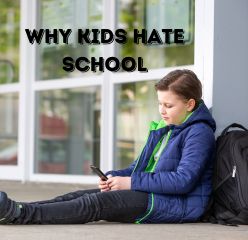Not all kids hate school. A lot of children do go through phases of disliking various things about their school experience. When that does happen, your kid’s unhappiness is felt throughout the entire family.
You desperately want to find ways to help them.
Some kids are really good at hiding their unhappiness though.
What are the signs that my child may be hating school?

If you notice that your child is displaying signs of disliking or hating school, it’s important to address their concerns and understand the underlying reasons. Here are some potential signs that kids hate school:
- Academic decline
A sudden drop in grades or a lack of enthusiasm towards schoolwork can indicate that you kid hates school. Your child may feel unmotivated or disengaged in their studies.
- Complaints or reluctance
If your child frequently complains about going to school, expresses a strong aversion, or tries to avoid school-related discussions or activities, it could be a sign that they are developing a negative attitude towards school.
- Physical symptoms
The stress or anxiety associated with disliking school can manifest in physical symptoms such as headaches, stomachaches, or general malaise. If your child frequently complains of feeling unwell on school days, it may be worth exploring the underlying cause.
- Social withdrawal
A child who dislikes school may isolate themselves from peers, exhibit a lack of interest in socializing, or struggle to form friendships. They may feel uncomfortable or excluded in their school environment.
- Behavioral changes
Noticeable changes in behavior, such as increased irritability, moodiness, or acting out, can indicate that your child is experiencing distress related to their school experience.
- Resistance to school-related activities
If your child shows a strong resistance to completing homework, participating in extracurricular activities, or engaging in school-related events, it could be a sign of their negative perception of school.
These are all signs that your kid may seriously hate their school experience. Some may refer to the hating of school as school anxiety. School anxiety may be defined as “an excessive fear of school and the activities associated with it, such as making friends, speaking in public, or taking tests.”
It is true that your child may be experiencing this. However, they could also be experiencing less of a fear and more of a lack of interest in school. If it is school anxiety, do not fret. They are not alone.
Is school anxiety normal?
Yes, school anxiety is a common phenomenon among children and adolescents. It is normal for some kids to experience varying degrees of anxiety related to school. The pressures of academic performance, social interactions, and the overall school environment can contribute to feelings of stress and anxiety in many students.
Why kids are scared to go to school?

Some key factors that may contribute to school anxiety include:
- Academic expectations
The pressure to meet academic standards, perform well on tests, or excel in certain subjects can create anxiety for students, particularly those who are perfectionistic or fear failure.
- Social pressures
School often involves navigating social dynamics, forming friendships, and dealing with peer relationships. Social anxieties, such as fear of rejection or bullying, can lead to increased anxiety in school settings.
- Transition periods
Transitions between grade levels, starting a new school, or facing changes in routine can trigger anxiety in children. These transitions may involve unfamiliar environments, new teachers, or different expectations, which can be overwhelming for some students.
- Performance anxiety
Public speaking, participating in group activities, or being evaluated by teachers and peers can cause anxiety in students who fear judgment or embarrassment.
- High workload and time management
Overloaded schedules, excessive homework, and time management challenges can contribute to feelings of stress and anxiety among students.
- Bullying or peer conflict
Being subjected to bullying, teasing, or exclusion by peers can create a negative school environment for children. Persistent experiences of mistreatment can lead to anxiety and a strong aversion to attending school.
- Lack of interest or engagement
If a child feels disinterested or unengaged in the curriculum or teaching methods, they may develop a dislike for school. Some students may struggle to find relevance or meaning in the subjects being taught, leading to feelings of frustration or boredom.
- Learning difficulties or academic challenges
Students who face learning difficulties, such as dyslexia, ADHD, or other learning disabilities, may experience anxiety related to their academic performance. Constant struggles in keeping up with their peers can contribute to a negative perception of school.
- Pressure to fit in or conform
The need to conform to societal or peer expectations can be overwhelming for some students. The fear of being judged or not fitting in can create anxiety and resistance towards attending school.
- Lack of support or resources
Inadequate support systems, limited resources for individual needs, or a lack of understanding from teachers and staff can contribute to a negative school experience. When students feel unsupported or overlooked, it can lead to anxiety and a sense of not belonging.
- Lack of positive relationships with teachers
Positive teacher-student relationships can significantly impact a student’s motivation and enjoyment of school. If a child feels disconnected from their teachers or experiences a lack of support and guidance, it can contribute to a negative perception of school.
What can I do if my child hates school?

If your child expresses a strong dislike or hatred towards school, it’s important to address their concerns and find ways to support them. Here are some things you can try.
1. Communicate openly. Have honest and open conversations with your child to understand their specific reasons for hating school. Create a safe and non-judgmental space where they can freely express their feelings and concerns.
2. Listen and validate their emotions. Show empathy and validate your child’s emotions. Let them know that their feelings are valid and that you’re there to support them. Avoid dismissing or minimizing their concerns.
3. Identify the underlying issues. Try to identify the root causes of your child’s negative feelings towards school. It could be related to academic struggles, social challenges, bullying, or other factors. Once you have a better understanding, you can address those specific issues.
4. Connect with teachers and school staff. Reach out to your child’s teachers and school staff to discuss your concerns and collaborate on finding solutions. Share your child’s perspective and work together to create a supportive environment that meets their needs.
5. Explore alternative educational options. If traditional schooling is consistently causing distress for your child, you may explore alternative educational options such as homeschooling, online schooling, or specialized programs that cater to different learning styles. Research and consider what might be the best fit for your child’s needs.
6. Foster a positive attitude towards learning. Help your child develop a positive attitude towards learning by finding activities or subjects they are interested in outside of school. Encourage their hobbies, provide educational resources, and show enthusiasm for their areas of interest.
7. Build a support network. Connect your child with supportive peers, mentors, or extracurricular activities where they can engage with like-minded individuals and develop a sense of belonging. A strong support network can make a significant difference in their overall school experience.
8. Advocate for your child. If necessary, advocate for your child’s needs within the school system. Attend parent-teacher meetings, collaborate with the school on individualized education plans (IEPs), or seek assistance from educational professionals who can provide additional support.
Each child’s situation is unique and it may take some time to find the best solutions. Patience, understanding, and ongoing communication are key to supporting your child and helping them navigate their feelings towards school.
Can parental involvement make a difference in a child’s attitude towards school?
Yes, parental involvement can make a significant difference in a child’s attitude towards school. When parents actively engage in their child’s education and demonstrate support, it can positively impact their overall school experience.
Are there any strategies to make school more enjoyable for kids?

Here are some positive approaches that could make a difference.
- Discover their interests. Encourage your child to explore their interests and integrate them into their school experience. Help them find connections between subjects they enjoy and their schoolwork, allowing them to see the relevance and value in their studies.
- Encourage active participation. Encourage your child to actively participate in class discussions, group projects, and extracurricular activities. Active involvement can make school more engaging and help them feel a sense of ownership over their learning.
- Foster positive relationships. Support your child in developing positive relationships with teachers, classmates, and other school staff. Encourage them to seek help, ask questions, and form connections within the school community. Positive social interactions can significantly enhance their school experience.
- Support a growth mindset. Teach your child about the concept of a growth mindset, emphasizing that intelligence and abilities can be developed through effort and perseverance. Encourage them to embrace challenges, learn from mistakes, and view setbacks as opportunities for growth.
- Make learning interactive. Look for opportunities to make learning interactive and hands-on. Incorporate educational games, field trips, experiments, or projects that allow your child to actively engage with the material and apply what they’ve learned.
- Individualize learning experiences. Work with teachers to individualize your child’s learning experiences as much as possible. Tailor assignments or projects to align with their interests, strengths, and preferred learning styles, providing a more personalized and enjoyable approach to learning.
- Celebrate achievements. Recognize and celebrate your child’s achievements, both big and small. Acknowledge their progress, effort, and accomplishments to boost their confidence and motivation. Positive reinforcement can contribute to a more positive perception of school.
- Encourage a healthy work-life balance. Help your child maintain a healthy work-life balance by ensuring they have time for relaxation, hobbies, physical activity, and social interactions outside of school. This balance can prevent burnout and enhance their overall enjoyment of the school experience.
- Seek extracurricular opportunities. Encourage your child to explore extracurricular activities that align with their interests and passions. Participation in clubs, sports, arts, or community programs can provide a sense of belonging, purpose, and enjoyment beyond the classroom.
- Stay involved and supportive. Continue to stay involved in your child’s education, showing support and interest in their school experiences. Attend school events, engage in conversations about their day, and provide a listening ear to address any concerns or challenges they may face.
By implementing these strategies, you can help create a more enjoyable and fulfillingn experience for your child at school.
7 alternative schooling options for kids who hate school
There are alternative schooling options available for children who dislike or struggle in traditional school settings.

These alternatives offer different approaches to education and may better cater to your child’s needs and preferences. Here are some alternative schooling options to consider.
- Homeschooling. Homeschooling involves educating your child at home, typically with the help of a parent or a tutor. It allows for a flexible curriculum tailored to your child’s learning style and interests. Homeschooling provides a personalized approach and allows for a more individualized pace of learning. READ: Why Homeschool? 9 Great Reasons from 6 Homeschooling Moms
- Montessori Schools. Montessori schools follow the educational approach developed by Maria Montessori, emphasizing self-directed learning, hands-on activities, and mixed-age classrooms. This approach fosters independence, creativity, and a love for learning.
- Waldorf Schools. Waldorf education emphasizes holistic development, incorporating academics, arts, and practical skills. It focuses on creativity, imagination, and hands-on learning. Waldorf schools often have a strong emphasis on nature and play-based activities.
- Online Schools. Online schools provide virtual learning environments, allowing students to complete their coursework remotely. These schools offer flexibility in terms of schedule and pacing. Online schools often provide a structured curriculum and certified teachers, ensuring a quality education.
- Charter Schools. Charter schools are publicly funded schools that operate independently. They often have specific educational approaches or themes, such as arts, sciences, or technology. Charter schools provide alternative educational models while still adhering to certain academic standards.
- Alternative or Progressive Schools. Alternative or progressive schools focus on innovative teaching methods, individualized learning, and student-centered approaches. These schools often offer project-based learning, experiential learning, and interdisciplinary curriculum to engage students in a more personalized way.
- Specialty Schools. Specialty schools focus on specific areas of interest or talents, such as performing arts, sports, or STEM (Science, Technology, Engineering, and Math). These schools provide specialized instruction and opportunities for students to excel in their areas of passion.
This article will hopefully have made it clear why kids hate school. Ultimately, if you’re here because of your own kid’s school anxiety, I hope you have got some ideas about how to approach it now!






5 Comments
You could be talking to me directly, i hated school, it does not help that I was not the brightest bulb in the house and my mum was a teacher. I dreaded every evening when I`ll be forced to do my home work, only to go to school the next day and other kids making fun because I “just could`t get it” thanks for sharing.
Good post. My daughter used to have bad school anxiety. She’s much better now, thankfully.
Great post! I never thought about how the stress can also cause physical symptoms like headaches. I learned so much, thanks for sharing!
I hated school because I was bullied a lot and was a loner. I also felt like I had to compete against extremely smart kids to maintain a high ranking in my school. Plus, I didn’t like being trapped in a school setting. While I would have loved for my kids to have the chance to go to public schools, our school systems around us are HORRIBLE. So, I selected to homeschool my kids. I have found so much joy in doing that with them. I have one who has a few classes left to go, and then I’ll only have one child left to get to graduation.
That’s amazing. You’re doing a great job because people who’ve homeschooled for only a couple of years have found it one of the most challenging things they’ve ever done. So to have done it for years is incredible.